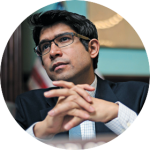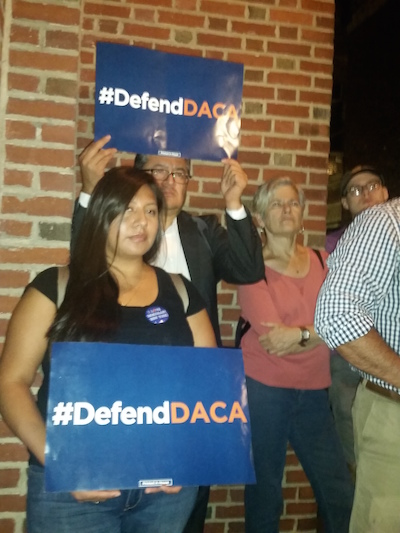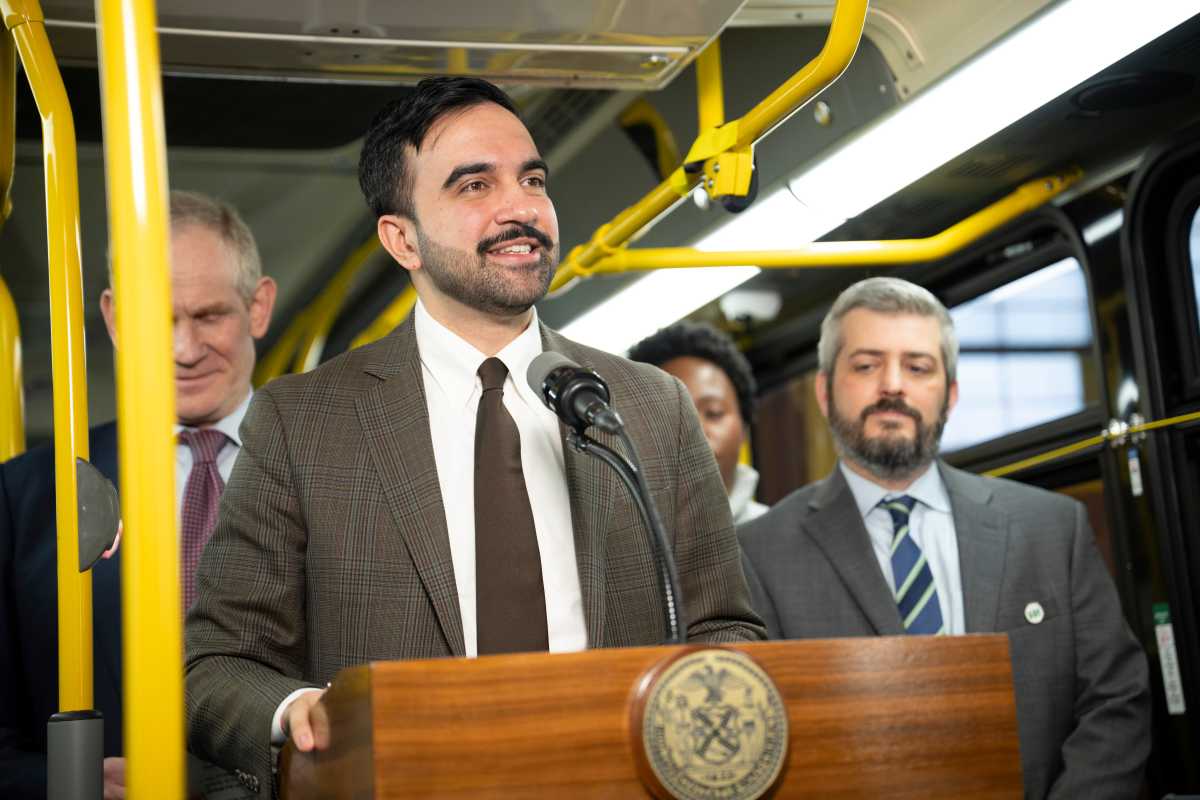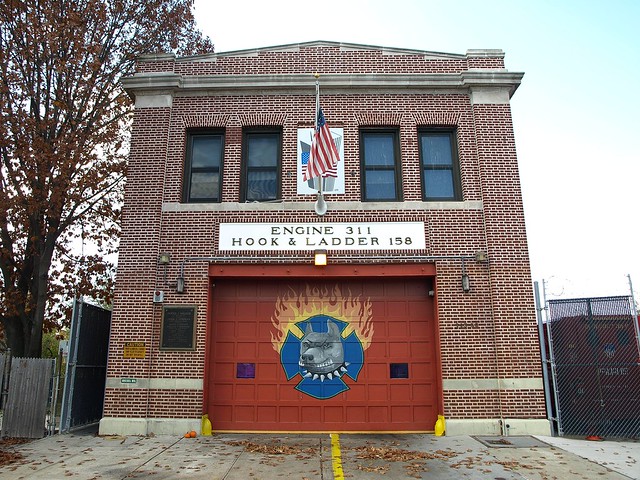For many of those gathered on the steps of St. Michael’s Church in Sunset Park following the first evening mass after President Trump’s decision to repeal the Deferred Action for Childhood Arrivals (DACA) — a policy that protects young undocumented immigrants from deportation and grants temporary work and student permits — the onslaught of emotions they felt could best be described as a sense of deja vu.
Trump, under a looming deadline, ordered the end of a five-year-old executive action protecting young undocumented immigrants from deportation. The president declared a March 25, 2018 deadline of which Congress must come up with a replacement. However, no future DACA applications will be accepted. The decision to roll back the Obama-era policy is slated to affect nearly 30,000 New York City residents currently protected under the executive action.
Trump himself reportedly had mixed feelings about setting the deadline, but after his Attorney General, Jeff Sessions, advised him that former President Obama’s executive action might not withstand several pending lawsuits, the president gave Congress the six-month ultimatum to take action on these childhood arrivals. Constitutional law gives Congress and not the president the authority to act on this issue.

City Councilmember Carlos Menchaca (D-Red Hook, Sunset Park) organized the rally and vigil at the church as a way for neighbors to show unity and support for one another, as well as to strengthen bonds and “stay informed, connected and organized [against] fraud, rumors and misinformation. We will protect our children and our community together.”
Menchaca’s mentor, Congresswoman Nydia Velazquez (D-Brooklyn, Queens, Lower Manhattan), decried Trump’s decision as a reflection of his callous and hateful ideology, but was also adversarial in extending an olive branch to her Republican colleagues in Congress to come up with a bipartisan bill that could set a pathway to citizenship for these childhood refugees.
“In coming weeks, I will be working with my Democratic colleagues to push the Republican leadership to allow for an up-or-down vote on a clean ‘DREAM Act’, so these young people – the face of America – are protected,” said Velazquez.
But political posturing aside, Trump’s decision left many local residents in the immigrant-heavy neighborhood of Sunset Park feeling unsure about their status in this country.
“Today’s news gave me the same feeling as after the [presidential] election — it’s a lot of pain,” said Sunset Park mom Laura Espinoza. “Why would they do that? This is what is making America great? To destroy? These are lives, families. . . It’s lost opportunity and destroys dreams.”
Espinoza and her 11-year-old daughter Britney were among a crowd of about 30 Sunset Park residents, neighbors and faith leaders who rallied at the church to express solidarity with DACA-eligible “Dreamers,” as well as the larger immigrant community.

“Why [Dreamers] came here was to study, they came when they were little and they’re not criminals,” said Britney Espinoza, a seventh grader who said that while DACA doesn’t directly affect her, “it is affecting a lot of people around us. I’m here because I don’t want people to get scared. This is not the right thing to do.”
The red-bricked church on Fourth Avenue was chosen for the gathering precisely because of the space it fills as a sanctuary.
“Our response is to speak for justice [and] believe in the power of prayer,” said Father Kevin Sweeney of St. Michael’s, who told the crowd that “as a son of immigrants” himself, he was happy to host the event.
“The young people [President Trump] speaks about, some are parishioners at St. Michael’s and are among the most active in the community,” Sweeney added. “Whether immigrants or children of immigrants, we’re all part of this beautiful country. When one is not respected, it is all of our responsibility to make sure the laws are just.”
Utilizing the law is an important part of the Sunset Park immigrant community’s effort to defend what rights they still have. Nonprofit organizations like Mixteca, and grassroots neighbor groups like Love Trumps Hate are holding ongoing workshops and dinners with social workers, lawyers, education advocates, and others who can help them navigate the legal system.
But as resident and Community Board 7 member Peter Wong noted, it’s an uphill battle.
“My wife is a Legal Aid Society immigration attorney and it’s scary; she sees a lot of people who did not know the system and pleaded to things they didn’t know the consequences of. It’s very nerve-wracking,” said Wong, who is also a member of the local chapter of Love Trumps Hate. Here in Sunset Park, “we have a really supportive community, but there’s never a guarantee in the courtroom, in schools, and elsewhere. It’s a climate of fear.”
With a new school year set to begin this week, the New York City Department of Education has reaffirmed its declaration that public schools are off-limits to federal immigration agents — a policy that was implemented in March and was tested this past May when Immigration and Customs Enforcement agents showed up at a Queens school looking for a fourth grader. They were turned away by school officials.
Schools Chancellor Carmen Farina and Mayor Bill de Blasio have said that students are welcome at city schools regardless of immigration status.
That is some comfort to parents like Wong and Espinoza, but the uncertainty remains, they say.
“All day, people want to go out, but don’t know if they’ll be able to go home,” said Espinoza. “We’re the same. We don’t know our future. We need to stand up, wake up and fight together, to defend our families and community. It’s not just Mexicans; it’s everyone. Now we never know what the president’s new laws will be. He doesn’t want us here.”
State Assemblymember Felix Ortiz (D-Sunset Park) also sent a letter to Governor Andrew Cuomo in support of a New York State Senate resolution “asking Congress to make sure we move forward and reject what the president has done to move the country backwards.”
Legislators from over 20 states are also in the process of introducing state versions of DACA to enshrine the protections into law.
– Stephen Witt and Kadia Goba contributed to this story










